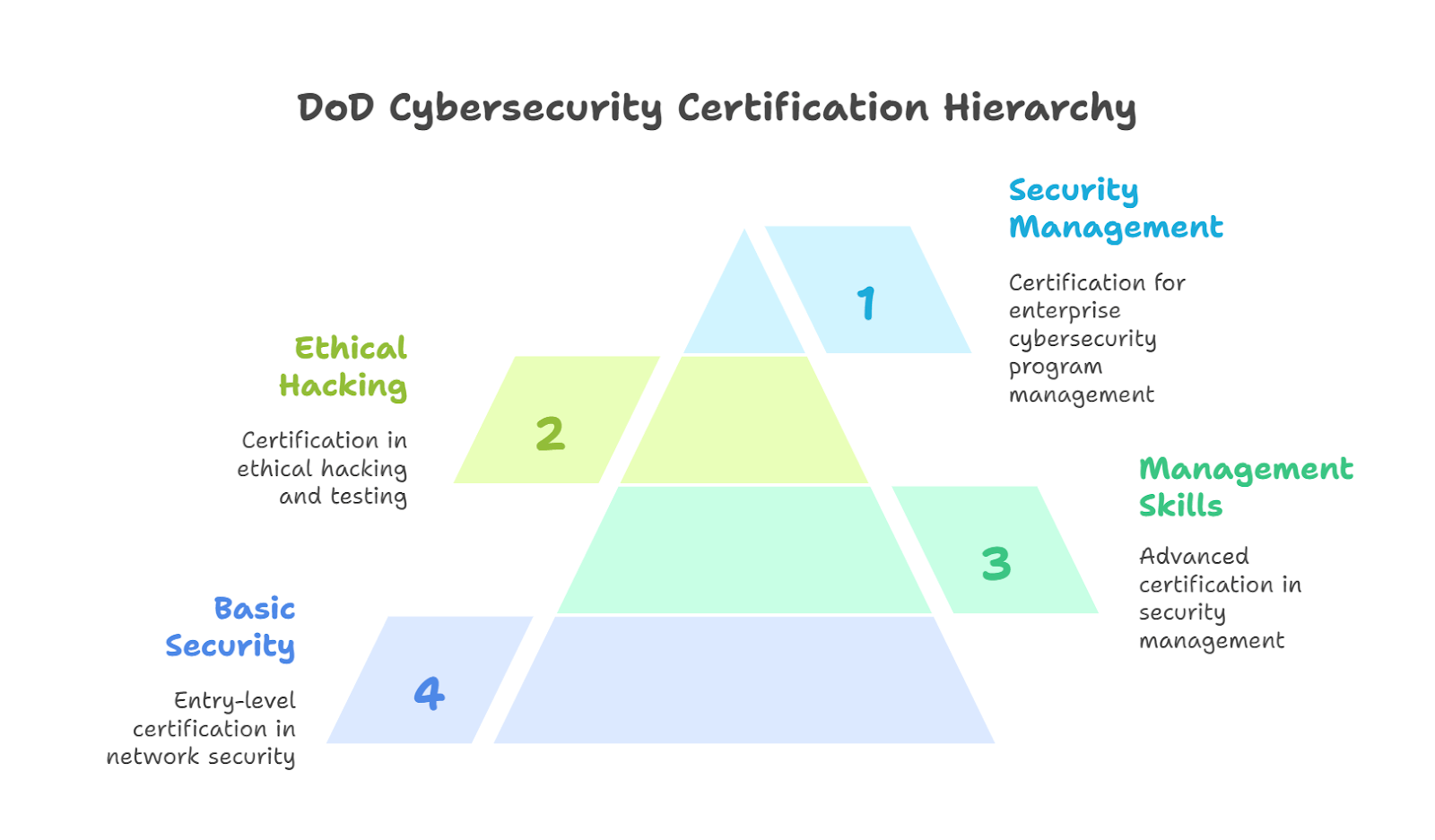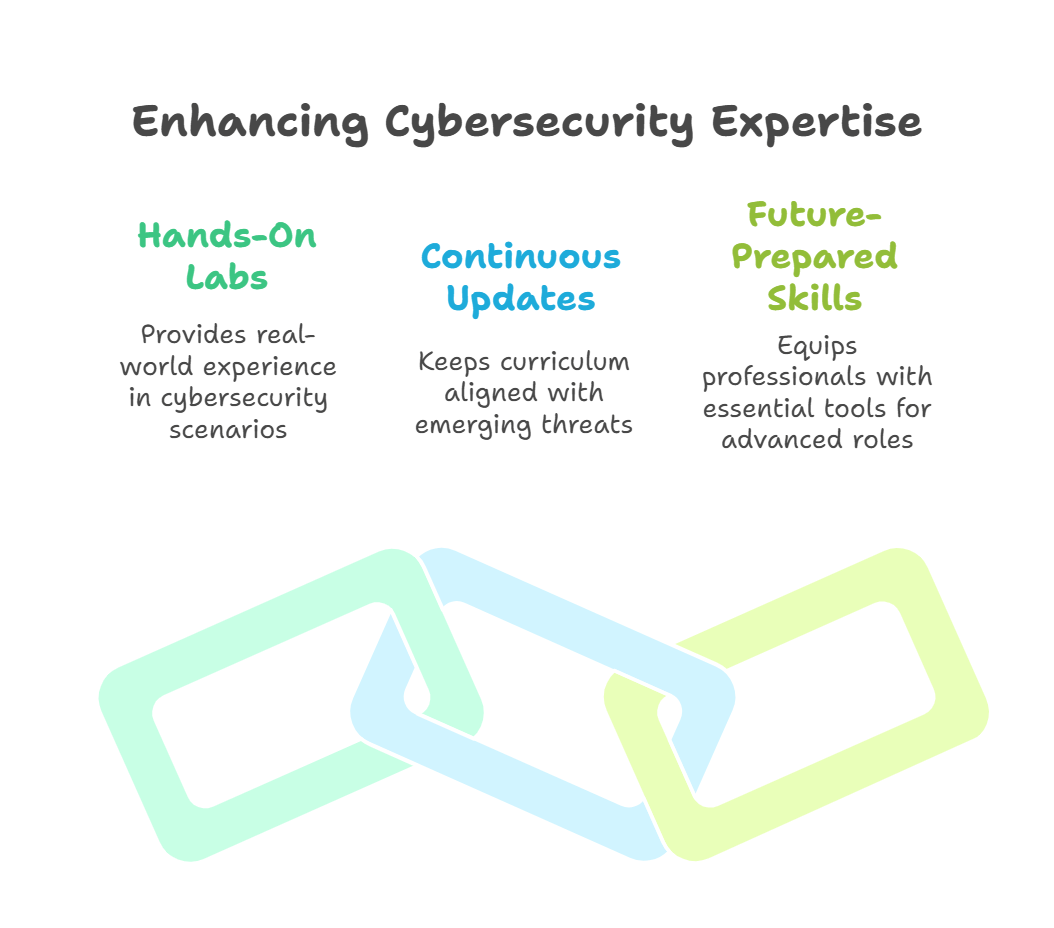Table of Contents
- What Are DoD Cybersecurity Certification Requirements?
- Why Do These Certifications Matter?
- Key Certifications Under DoD Requirements
- Meeting DoD Requirements with Advanced Training
- How to Obtain DoD Cybersecurity Certifications
- Benefits of Meeting DoD Cybersecurity Certification Requirements
- Final Thoughts
- FAQ on DoD Cybersecurity Certification Requirements
Cybersecurity has become one of the most critical fields in today’s digital landscape, especially when it comes to the defense and protection of sensitive national assets. The Department of Defense (DoD) plays a significant role in securing national defense systems, and as the volume and sophistication of cyberattacks continue to grow, the Cybersecurity Maturity Model Certification 2.0 ensures that professionals in the sector possess the necessary skills and knowledge to protect critical information and systems while meeting the DoD cybersecurity certification requirements.
What Are DoD Cybersecurity Certification Requirements?

The DoD cybersecurity certification requirements were established under the DoD’s Cyber Workforce Framework (CWF) and align with the DoD’s cybersecurity directives. These certifications, outlined by the DoD 8570/8140 directive, specify the mandatory certifications required for professionals working within the DoD or for its contractors. These certifications are aimed at ensuring that cybersecurity professionals meet certain standards of competency, providing them with the knowledge and skills needed to secure sensitive systems.
The cybersecurity roles within the DoD are categorized into three primary groups:
-
Information Assurance Technical (IAT): This category is for technical staff responsible for managing and securing systems.
-
Information Assurance Management (IAM): Cybersecurity managers who oversee system protections and compliance fall into this category.
-
Cybersecurity Service Provider (CSSP): Specialists tasked with monitoring, detection, and incident response within cybersecurity frameworks.
These certifications ensure that personnel possess the skills necessary to carry out the responsibilities that are critical to maintaining cybersecurity within the DoD.
Why Do These Certifications Matter?
The DoD cybersecurity certification requirements are not just a formality; they serve several vital purposes:
-
National Security: These certifications ensure that personnel can protect critical networks from sophisticated cyber threats, which is crucial for maintaining national security.
-
Compliance: DoD contractors and employees must meet these standards to ensure that they remain compliant with regulations and avoid penalties.
-
Career Advancement: Cybersecurity professionals with these certifications are better positioned to secure high-paying roles and advance their careers within the defense and cybersecurity sectors.
Key Certifications Under DoD Requirements
To meet the DoD cybersecurity certification requirements, individuals must obtain certifications that are approved under the DoD 8570/8140 guidelines. These certifications are essential for anyone working within or in partnership with the DoD. Some of the most widely recognized certifications include:
-
CompTIA Security+: This entry-level certification covers basic concepts in network security, risk management, and incident response. It is widely recognized and required for many entry-level IT security positions.
-
Certified Information Systems Security Professional (CISSP): An advanced certification that focuses on managing and designing security protocols and systems within larger networks. CISSP is aimed at professionals with experience in cybersecurity management and is often required for higher-level positions.
-
Certified Ethical Hacker (CEH): This certification focuses on ethical hacking methods and penetration testing, teaching professionals how to identify vulnerabilities and prevent hacking attempts.
-
Certified Information Security Manager (CISM): This certification is designed for professionals who develop and manage enterprise-level cybersecurity programs. It focuses on governance, risk management, and security strategy.
Meeting DoD Requirements with Advanced Training

Obtaining certifications is essential to meet DoD cybersecurity certification requirements, but the DoD’s cybersecurity demands are continuously evolving with emerging threats. As a result, gaining additional skills and practical experience is crucial for excelling in your role. Programs like ACSMI Certification offer comprehensive, hands-on training with over 400 modules covering various advanced cybersecurity topics, helping professionals stay competitive and improve their Google Cybersecurity Certification Salary prospects.
Why Supplement Your DoD Certification with ACSMI?
-
Hands-On Labs: Gain real-world experience with scenarios such as malware analysis, forensic investigations, and defense simulations.
-
Continuous Updates: Stay ahead of emerging cybersecurity threats like AI-based risks, with a curriculum that evolves with industry changes.
-
Future-Prepared Skills: Learn essential tools and strategies critical for advanced roles in the ever-changing cybersecurity landscape.
How to Obtain DoD Cybersecurity Certifications
To meet the DoD cybersecurity certification requirements, follow these steps:
-
Identify Your Role: Understand the specific role you’re fulfilling in the CWF categories (IAT, IAM, or CSSP) and select the corresponding certification.
-
Choose a Training Program: Select a program that aligns with your certification goals. Look for providers offering hands-on training and simulated labs to gain practical skills.
-
Study and Earn Certification: Focus on coursework in areas like risk management, cryptography, compliance, and operations before taking and passing your certification exam.
-
Renew Certifications: Most certifications require regular renewal through continuing education or re-examination. Stay current to keep your skills up-to-date and relevant.
Benefits of Meeting DoD Cybersecurity Certification Requirements
Meeting the DoD cybersecurity certification requirements can significantly boost your career and bring several key advantages:
-
Access to High-Demand Roles: Certified professionals are eligible for critical positions within the DoD and its contractors, which often come with substantial career opportunities.
-
Enhanced Professional Credibility: Meeting DoD certification standards signals to employers that you possess the necessary skills and knowledge to meet stringent cybersecurity requirements.
-
Freedom to Work on Sensitive Defense Projects: Certified individuals are eligible to work on classified and defense-related projects, which play a vital role in national security.
-
Lucrative Salary Prospects: Certified professionals generally earn higher salaries compared to their uncertified peers due to the specialized skills they possess.
Final Thoughts
Meeting the DoD cybersecurity certification requirements is crucial for anyone aiming to work in the cybersecurity field, especially in roles involving national defense or sensitive government projects. These certifications not only validate your knowledge and skills but also open doors to rewarding and high-responsibility roles in the cybersecurity sector. For those looking to further enhance their expertise, ACSMI Certification provides a robust training program that complements DoD certifications, offering practical, hands-on experience that will prepare you for leadership positions in the ever-evolving cybersecurity landscape. Start your certification journey today and take the next step in securing a rewarding career in cybersecurity.
FAQ on DoD Cybersecurity Certification Requirements
What Are DoD Cybersecurity Certification Requirements?
The DoD cybersecurity certification requirements are qualifications mandated by the Department of Defense for cybersecurity professionals. These certifications ensure that professionals are capable of managing and securing sensitive systems effectively.
Are There Prerequisites for DoD Certifications?
Many of the DoD certifications require basic IT knowledge. Entry-level professionals can start with certifications like CompTIA Security+ before moving to more advanced programs like CISSP or CISM.
How Long Does It Take to Get Certified?
The time to obtain certification depends on the program. Entry-level certifications typically take a few weeks to months, while more advanced certifications may require several years of experience and additional study.
How Do I Maintain My Certification?
Most certifications require renewal through continuing education or re-examination every 2 to 3 years. Programs like ACSMI offer ongoing training to help professionals meet renewal requirements.
What Happens If My Role Changes?
If your role changes within the DoD framework, you may need to pursue additional certifications. It’s important to stay informed about the requirements specific to your new role.

Leave a Reply